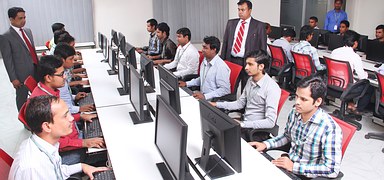Education Within Grasp: Jobs out of Reach?

Introduction
What is the aim of a college and university education?—to broaden one’s horizons and awareness in a particular field, to increase one’s knowledge, and more importantly, to secure a well-paying job in the future. Indian institutions of higher studies are internationally renowned for producing some of the most educationally and intellectually bright students. However, do these colleges equip their students with the skills required to confront the numerous challenges of joining the workforce? Research and surveys suggest otherwise.
It has been found that students who graduate from Indian institutions (in various streams, such as science, engineering and the humanities) have been unable to secure a well-paying job and effectively cope with the rigors of employment; such has been the nature of India’s education system that it has rendered its students helpless when exposed to the actual world. This scenario has alarmed and shaken teachers and professors across the country, who have consequently suggested a new form of curriculum to be followed in schools—one that is designed in collaboration with the industry and encourages students to pursue internships in their respective fields.
The State of Indian Graduates
According to a survey conducted by Pearson India, 57% of teachers agree that graduating students are not adequately prepared to cope with the academic and social rigours of employment. India Today also reported that three-quarters of Indian teachers support the redesigning of college curriculum to one that is in collaboration with industry. The Times of India even provided an example of an engineering student, A K Gupta, who graduated with high honours from a renowned university in 2013, but still hasn’t gotten a job; he is only one among many Indian students who is struggling to secure a job offer, albeit being well-educated and knowledgeable. When reading a post on the site Youth Ki Awaaz, written by an IIT undergraduate student Rahul Maganti, one particular line stood out—“The little I learnt during the course of mugging for exams get erased as soon as the exam is done. I am pretty much sure that I would not be able to take a paper of a course in a previous semester now”. If this is the case in one of the top institutions in the nation—attending classes for the sake of examinations and high GPAs—how can the country’s most educated scholars be competitive and competent in the job market?
Methods of Improvement
India is a country whose growth rate is one of the fastest in the world; it has not only an abundance of youth who can contribute to the workforce, but also numerous educational institutions that can educate these students. However, the employability of these students will not improve unless their education provides them with the necessary qualifications and vocations to do so. So, teachers have suggested the integration of technology and digitizing of learning methods, in addition to an increased emphasis on inter-disciplinary learning. Certainly, learning is important, but how a student is taught—where the stress is laid, how the concepts are conveyed, and how the lessons learned can be applied in real life situations—are just as important. Aligning with the aim to make teaching more holistic, 66% of the professors and teachers deemed computer training and internet connectivity an absolute requirement in institutions, as well as the installation of smart boards and other electronic equipment. Furthermore, some teachers also suggested the assimilation of ethics, life skills and moral education into the core curriculum, since they believed that this inclusion would make their students more employable.
Conclusion
This is a key and creative idea, which can truly contribute to the improvement of the employability of Indian graduate students. There is nothing worse than investing large amounts of money and time into gaining an education and degree, and ultimately finding out that what has been obtained is not enough to sustain and establish oneself in the national and global scheme of affairs. Therefore, if students are given the opportunity to strengthen their base, and hone the skills that are required to get a good, respectable job, the education that they had devoted so much toward can ultimately become worthwhile—all that is needed is a positive change concerning the methods of teaching. And now that the problem has been identified and agreed upon by a majority of the educational instructors, only the implementation is left; certainly, this task of execution is a large one, but the larger step has already been fulfilled—raising awareness and inculcating among the masses the need to improve teaching in institutions.
[Image Attribute: Shumicpi]


